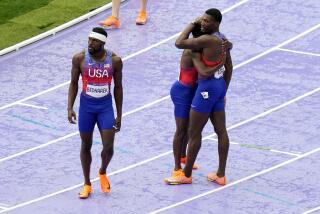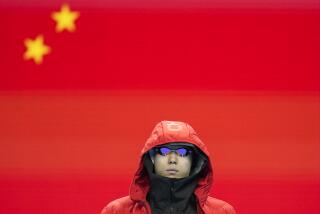Baldwin: Russians ‘Anti-American’
- Share via
SALT LAKE CITY — The president of the U.S. Olympic Committee accused Russia’s top Olympic official Saturday of waging an “anti-American” campaign in a string of protests over results at the Winter Games.
Vitaly Smirnov, an International Olympic Committee executive board member, was upset by a poorer-than-expected medals showing by Russia’s athletes and turned his displeasure to the host country, USOC President Sandy Baldwin said from Salt Lake City.
Asserting that “every Games needs a little drama,” Baldwin said the protests from such countries as South Korea and Canada over figure skating, skiing and speedskating were part of the Olympics and helped attract attention around the world. Russia’s protests, including an aborted threat to pull out of Salt Lake City, were another matter, she said.
“I haven’t felt, except for the Russians, that it was anti-American,” Baldwin said. “That was unfortunate. It doesn’t have anything to do with the athletes, the referees or the United States.
“I think we may be seeing a lot of Mr. Smirnov’s feelings about a shift in fortunes of Russian athletes.”
A visibly upset Smirnov denied Baldwin’s accusation. “It’s not anti-American,” he said. “No! The answer is no! She’s wrong!”
Smirnov said he had personally praised U.S. management of the Games, including telling Mitt Romney, the Salt Lake Organizing Committee chief, that these were among the best Games he has seen in 31 years on the IOC. “The Russian team and myself have nothing, no criticism, for the United States or SLOC,” Smirnov said.
*
An “angry” International Ice Hockey Federation President Rene Fasel issued a statement in response to Russia Coach Slava Fetisov’s comments after Russia’s 3-2 loss to the United States in the semifinal game. Fetisov said: “It is designed to have finals between Canada and USA” and added that the NHL officials used in the Games were prone to bias toward North American teams.
Fasel responded: “You can always criticize certain calls and try to prove that the referee made a mistake in a certain situation. But when a coach of a team tries to undermine and question the integrity of the Olympic ice hockey tournament, it makes me very angry and disappointed.”
When Fetisov’s comments were relayed to United States Coach Herb Brooks, Brooks said: “My friend Slava said that? That’s preposterous.
“I know they might be feeling a lot of pressure. I heard their president called Slava. And all I know is, Bush hasn’t called me.”
Marie-Reine Le Gougne, the French judge in the middle of the figure skating controversy, said she was under pressure from Canada, not her country’s federation, before voting for the Russians in the pairs final, the New York Times reported. Le Gougne, in an interview from her lawyer’s office in Salt Lake City, said that despite the pressure she voted with her “heart and soul.”
Michael Chambers, president of the Canadian Olympic Assn., dismissed the claims, also made last week in an interview with the French sports paper L’Equipe. Le Gougne said sheblamed the French federation only because she lost her ability to fight accusations being made by other skating officials. “I was so mixed up in my mind, I had trouble thinking properly,” Le Gougne told the Times
*
Eric Heiden, vilified by some in the media for saying he had turned down a chance to be one of the final torchbearers in the opening ceremony because he hadn’t been chosen to light the caldron, believes he got an unfair rap.
Heiden, who swept five men’s speedskating gold medals at the 1980 Games, told the Salt Lake Tribune he believed NBC had dictated the choice of who would light the caldron, tainting the honor. He said he had been offered a chance to be among the first to carry the flame in the U.S., after it arrived in Atlanta from Greece in December, but couldn’t leave his medical practice on short notice. “I told them, just kind of joking, that I wanted to be the last,” Heiden said.
*
Times staff writers J.A. Adande, Helene Elliott and Alan Abrahamson, and the Associated Press contributed to this report.
More to Read
Go beyond the scoreboard
Get the latest on L.A.'s teams in the daily Sports Report newsletter.
You may occasionally receive promotional content from the Los Angeles Times.






